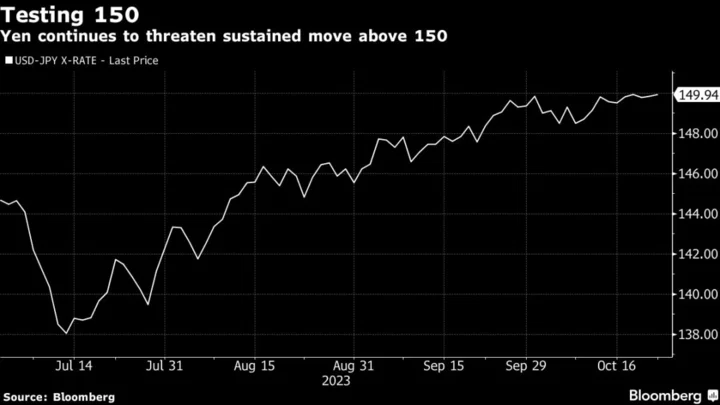Speculation that the Bank of Japan will make some kind of policy move this month continues to build with the weak yen, higher bond yields and stronger-than-expected inflation fueling the market chatter.
A report by the Nikkei business daily over the weekend helped feed the growing expectations of possible BOJ policy action at its board meeting ending on Oct. 31. The central bank will likely ponder whether to tweak its yield curve control program at the gathering, it said.
Still, the report also flagged a difference of views among officials and was lacking detail on what action the central bank might take if it acted.
Governor Kazuo Ueda has already taken more action than expected to tweak the central bank’s guidance on policy and its control of yields. But he remains in a tight spot as inflation continues to outpace the BOJ’s long-held target, yields creep closer to a level he said was unlikely to be reached and the yen continues to threaten a sustained move beyond the 150 mark.
Ueda has insisted he needs to see more evidence that wage growth will support the goal of sustainable inflation in a country known for weak prices, but central bank watchers see sufficient reasons for the BOJ to consider taking action sooner rather than later.
“It wouldn’t be a surprise if the BOJ takes some kind of action given the tough situation of the yen’s weakness,” said Takahiro Sekido, chief Japan strategist at MUFG Bank Ltd. in Tokyo and a former BOJ official.
Japan’s currency punctured the 150 mark against the dollar again early Monday before quickly retreating as market players try to gauge how far they can let dollar strength and interest rate differences between the US and Japan drive the yen lower without triggering currency intervention by Tokyo.
Ueda was unusually candid in July when he cited currency volatility as one of the factors behind a move to let bond yields move more freely. The BOJ essentially doubled the cap on 10-year government debt yields at the meeting, allowing them to drift well above the previous lid of 0.5%, a factor that has helped support the yen by fractionally reducing the rate differential with yields on long-term Treasuries.
Japanese 10-year yields touched a fresh decade high of 0.855% Monday as they edged close to 1%. The central bank can step into the market to buy more bonds than scheduled to keep the yield moves in check, but each time it takes action that supports its current stimulus stance, it risks nudging the yen lower.
The latest national figures showed inflation cooling below 3% in September for the first time in more than a year, but it still remains well above the BOJ’s 2% target. That begs the question of why the BOJ is sticking with full-bore stimulus.
BOJ officials see the bank’s projection for its key inflation gauge likely being revised higher to 2% or more for the year starting in April, according to people familiar with the matter. That would equate to expectations of inflation above or at the central bank’s target for three straight years, a factor that could be used to justify policy tweaks.
Last week’s stronger wage demands from unions for next year’s pay negotiations also provides the central bank with a favorable factor for achieving its target. Still, last month the consensus view among economists for a clear pivot in policy and the end of negative rates was still penciled in for April after the wage talk results are clear.
Tweaking guidance on policy to hint at a change in the negative rate is one option for the BOJ this month, as is raising the YCC ceiling above 1%, according to Sekido.
“It’s not ideal for the BOJ to move now as it hasn’t been able to confirm the prospects of further wage growth,” said Sekido. “Yet it may not have much choice.”

